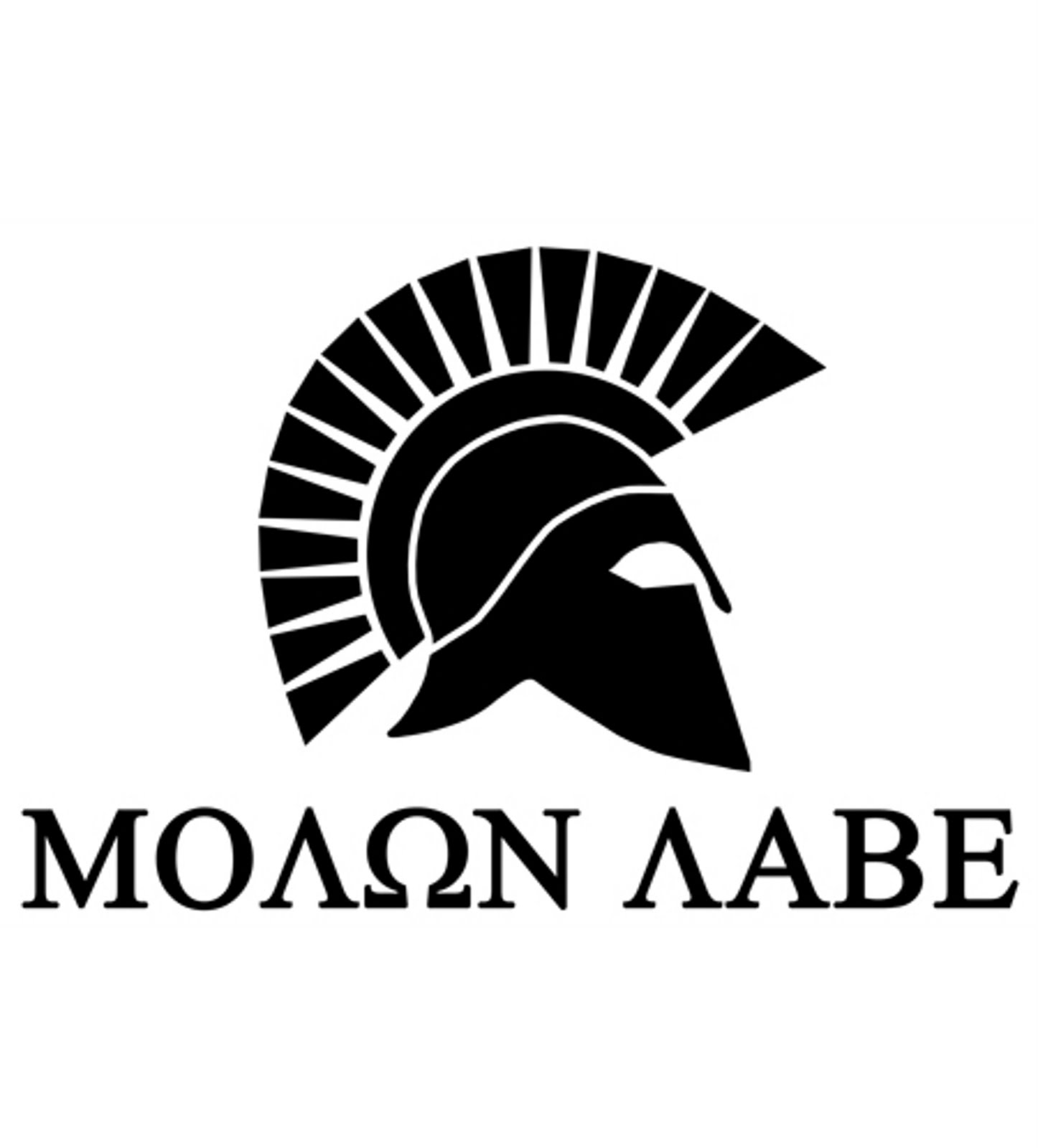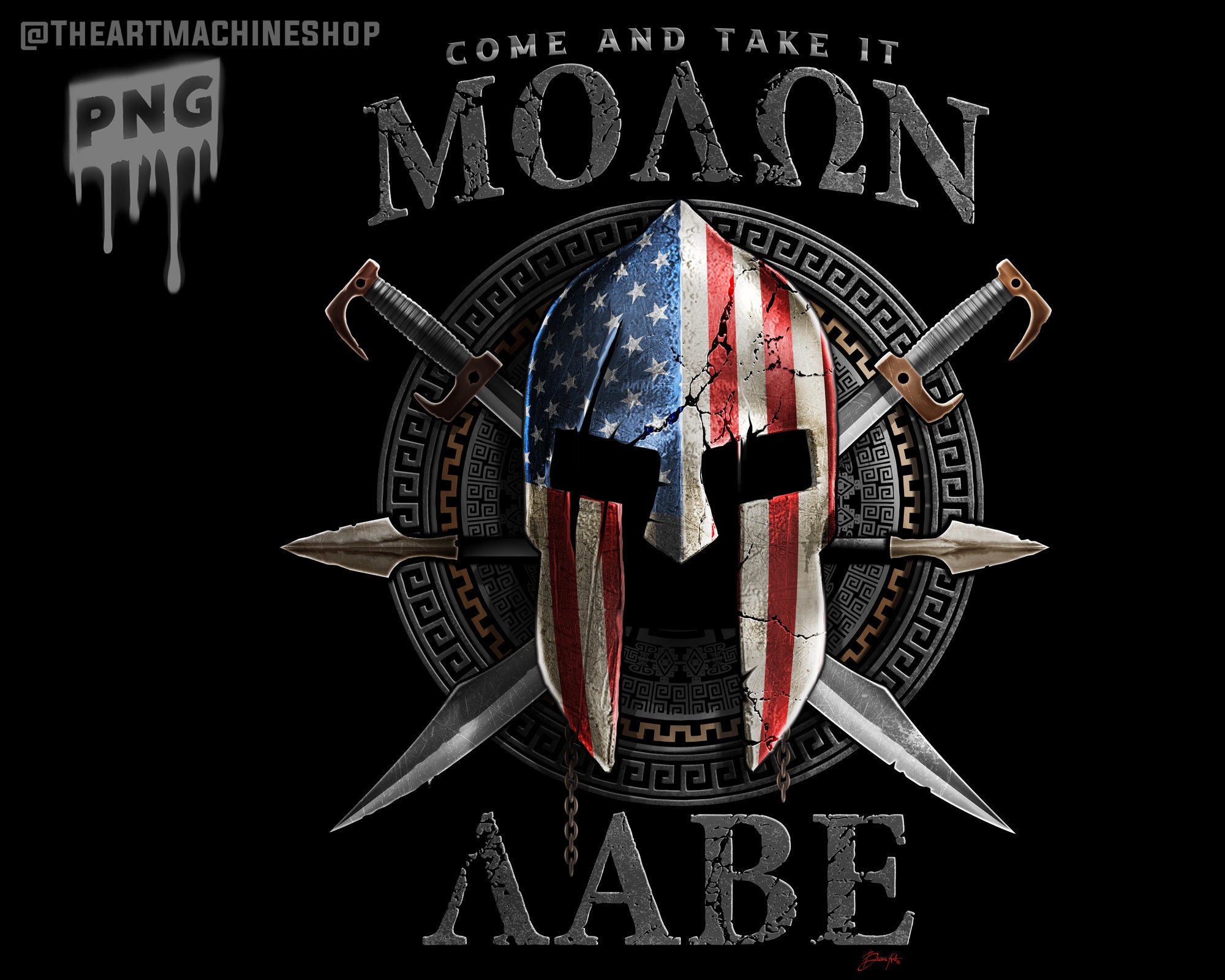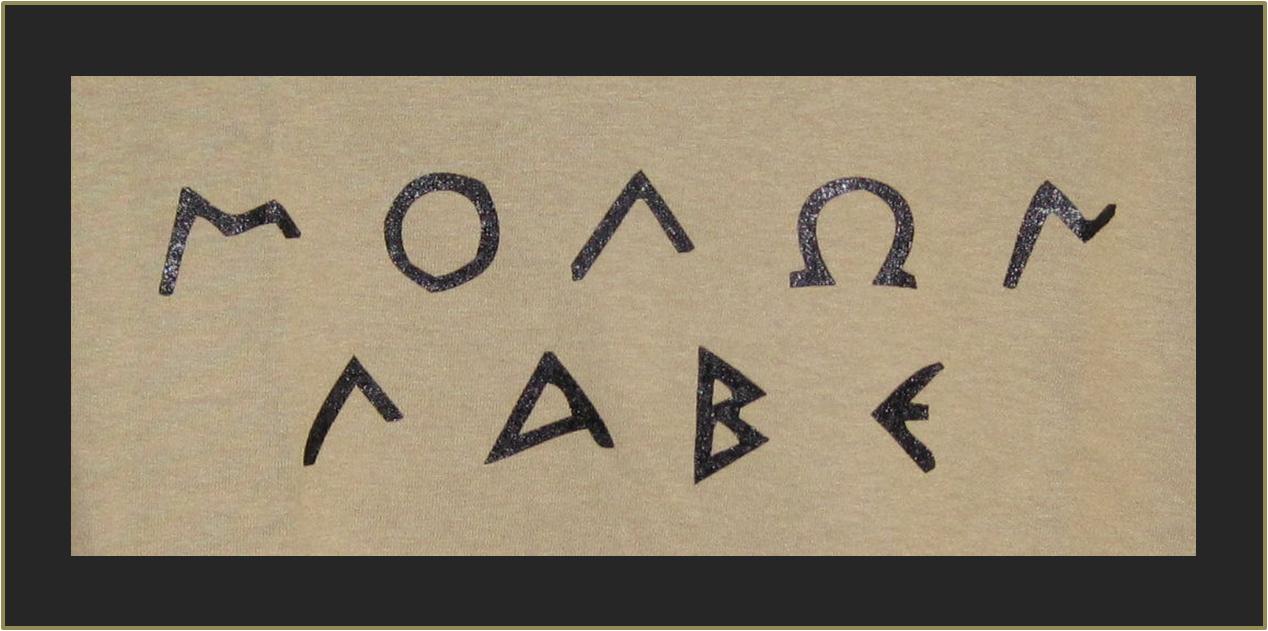
Molon Labe Vinyl Decal White Vinyl Decal 6.7Inches
By contrast, there are very few phrases from the ancient Greek language that ordinary people can even recognize in the original language. μολὼν λαβέ ( molṑn labé) is one of those phrases. Literally, it means: "Having come, take." More idiomatically, it can be translated as: "Come and take them." Most people have heard a story about this phrase.

MOLON LABE Molon Labe TShirt TeePublic
Molon labe ( Ancient Greek: μολὼν λαβέ, romanized: molṑn labé ), meaning 'come and take [them]', is a classical expression of defiance. It is among the Laconic phrases reported by Plutarch, attributed to King Leonidas I in reply to the demand by Xerxes I that the Spartans surrender their weapons.

Molon Labe Wallpapers Wallpaper Cave
Molon Labe - or if you want to see it in Greek script, ΜΟΛΩΝ ΛABE, is a popular phrase with Second Amendment enthusiasts and activists. It's used by a number of military units worldwide, including both American and - naturally - Greek military forces. The phrase roughly translates to "come and get them," with the implied meaning being a.

Molon Labe ΜΟΛΩΝ ΛΑΒΕ Meaning and History Ultra Patches Blog
What Does Molon Labe Mean? The phrase "molon labe" is a classical Greek expression of defiance. It is commonly translated as " come and take [them] " and is attributed to King Leonidas I of Sparta. The phrase has become a popular slogan among gun-rights advocates in the United States.

Molon Labe Greek Morale Patch
August 6, 2012 Today is the anniversary of the Battle of Thermopylae (480 BC), one of the most famous battles in history . King Leonidas of Sparta said the phrase Molon Labe (means "Come and take them" in ancient Greek) to Xerxes I of Persia 2492 years ago when the Persians asked the Spartans to lay down their arms and surrender.

Molon Labe Greek Lettering vinyl Decal Etsy
Gadsden, Patriote and Molon Labe flags have been seen at vaccine-mandate protests Katie Nicholson · CBC News · Posted: Feb 15, 2022 7:00 AM PST | Last Updated: February 16, 2022 A man waves a.

THE WESTERNER The Meaning and History of ‘Molon Labe’
Molon Labe [What It Means, Origin, & Pronunciation] What does Molon Labe mean? What's the origin? How do you pronounce it? And why does it seem gun folks are obsessed with it? BY Matthew Collins, Published February 9, 2019 11 Comments Bookmark You've seen the shield online with the "Molon Labe" tag under it. You've seen the bumper stickers.

Come And Take It Skull Flag Molon Labe Rifles Flags For Sale 3x5 Ft Come And Take It Greek
August 8, 2023 by Aden Tate Molon Labe (μολὼν λαβέ) is an Ancient Greek declaration of resistance against the surrender of arms to an adversary. The phrase has been used for centuries. However, gun rights advocates in America have begun using it to express their opposition to passing restrictive gun control legislation.

Top 23 Molon Labe Tattoo Designs and What They Mean
"Molon Lave Taverna" Where Greek Flavors Conquer Your Plate! Get ready to embark on an extraordinary culinary escapade right here in Toronto! Welcome to our place, where the spirit of Greece comes alove in every bite. Indulge in a delectable array of dishes, inspired by time-honoured recipes that play tribute to Greece's cultural heritage.

MOLON LABE Molon Labe TShirt TeePublic
Pronunciation "ΜΟΛΩΝ ΛΑΒΕ" or "Molon Labe", pronounced in the United States as (Mow-Lawn-Lah-Bay). If you want to pronounce it like the Greeks it's (Mow-Loan-Lah-Vay). Spelling Greek (UPPERCASE): ΜΟΛΩΝ ΛΑΒΕ Greek (First Letters Uppercase): Μολὼν λαβέ English (UPPERCASE): MOLON LABE English (First Letters Uppercase) : Molon Labe

MOLON LABE Molon Labe Mask TeePublic
Let's find out. What is Molon Labe and Where Does it Come From? The Greek philosopher and biographer Plutarch (AD 46-119) attributed the expression to Leonidas I, king of Sparta, the warrior Greek city-state. During the Greco-Persian Wars, Xerxes I, the King of the First Persian Empire, was determined to conquer Greece.

Molon Labe in ancient greek Molon Labe Pinterest
The phrase molon labe (Ancient Greek μολών λαβέ molṑn labé; reconstructed Ancient Greek pronunciation [molɔːn labé]; Modern Greek pronunciation [moˈlon laˈve]) means "Come and take".

Molon Labe Original Thin Greek Come & Take it Car Window Decal Etsy
1 The Origin of the Molon Labe 1.1 Let's Go Back to Ancient Greece 1.2 The Use of Molon Labe Today The Origin of the Molon Labe Before we recount its origin, it's important to know how to properly pronounce the phrase so you don't embarrass yourself when discussing it.

Molon Labe Greek Morale Patch
The context behind molon labe may not be known to all who deploy the phrase, but many no doubt are aware, in part thanks to Snyder's 300, that it stems from a Greek war against foreign invaders.

Molon Labe
Molon Labe —Ancient Greek for "come and take them," or literally: "Come! Take!"—is a phrase frequently invoked by the right-wing fringe of the "2A" community of gun owners.

Molon Labe A Study in American Solidarity Outdoor Hub
Molon labe ( Ancient Greek: μολὼν λαβέ, romanized : molṑn labé ), meaning 'come and take [them]', is a classical expression of defiance. It is among the Laconic phrases reported by Plutarch, [1] attributed to King Leonidas I in reply to the demand by Xerxes I that the Spartans surrender their weapons.